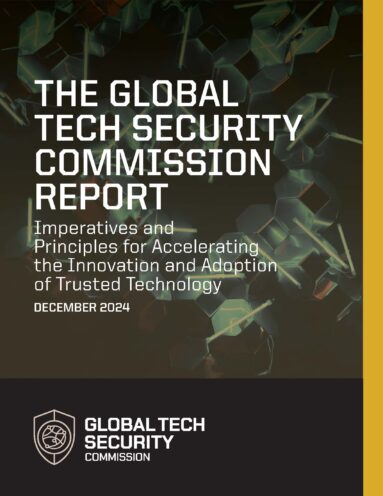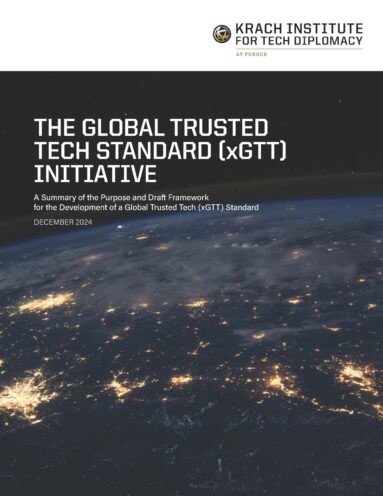An Analysis on the Collision Between Emerging Technologies and 21st Century Geopolitics
As part of its mission to ensure that technology advances freedom, the Global Tech Security Commission began its work with a comprehensive analysis of the role of new technologies as a lever of power in the contest between free societies and authoritarian regimes. This effort included a competitive analysis and an assessment of strengths, weaknesses, opportunities, and threats (SWOT) of the U.S. and its allies, as well as authoritarian regimes.
In every era of human history, civilizations, nations, and their peoples have developed technologies to secure their interests and gain advantages over one another. But the scale and pervasiveness of modern technologies makes competition today profoundly different from that in previous eras. Semiconductors are the beating heart of every device with an on-off switch, including critical infrastructure. The world’s data is increasingly stored on cloud platforms. Satellites relay signals to billions of people worldwide. Governments are reconfiguring national transportation systems around clean energy technologies and connected vehicles.
Artificial Intelligence is especially emerging as a cornerstone of modern technological and economic competition. AI is not only vital for maintaining a strategic edge but also essential for enhancing national security, addressing pressing societal challenges, and bolstering economic growth. Goldman Sachs has theorized that AI alone could be responsible for driving a 7% increase in global GDP by 2033.[i]
But AI is not without complications. For one, the rapid expansion of AI capabilities comes with significant infrastructure demands, particularly in the form of immense energy requirements. ‘The need for AI infrastructure will reshape our national energy strategy, as AI’s hunger for power is unprecedented,” says Erik Bethel, GTSC Commissioner for Financial Technologies. “Ensuring that nations can sustainably meet the power needs of AI will be crucial to securing their technological future and safeguarding its strategic interests.”
Second, in the face of competition from authoritarian regimes, a pragmatic approach to AI development is crucial. While the protection of individual rights and privacy remains paramount, the U.S. and its allies must be mindful of the strategic implications of falling behind in the AI race. Ethical considerations and risk mitigation are essential. But the Commission also recognizes the danger of over-regulation in the early stages of AI development. A balanced approach is crucial, one that ensures responsible innovation while allowing for the necessary exploration and experimentation to drive progress and maintain free nations’ competitive advantage.
Whoever becomes the leader in this sphere will become the ruler of the world.
— Russian President Vladimir Putin, commenting on artificial intelligence, September 2019[ii]
Second, in the face of competition from authoritarian regimes, a pragmatic approach to AI development is crucial. While the protection of individual rights and privacy remains paramount, the U.S. and its allies must be mindful of the strategic implications of falling behind in the AI race. Ethical considerations and risk mitigation are essential. But the Commission also recognizes the danger of over-regulation in the early stages of AI development. A balanced approach is crucial, one that ensures responsible innovation while allowing for the necessary exploration and experimentation to drive progress and maintain free nations’ competitive advantage.
In the context of geopolitical competition, emerging technologies are not just a means of obtaining superior military power. They are also the most powerful tools in the world for maintaining human flourishing, exerting economic might, disseminating information, and protecting (or, sadly, abusing) human rights.
The comprehensive, “4-dimensional” nature of competition between the free world and authoritarian states will take place across diplomatic, economic, cultural and informational, and military lines—and technology is the crossroads. Given the importance of emerging technologies to these areas and all aspects of modern life, it has never been so important to ensure that the actors controlling them do not use them to do harm at scale.
The vast ocean of data, just like oil resources during industrialization, contains immense productive power and opportunities. Whoever controls big data technologies will control the resources for development and have the upper hand.
— Chinese Communist Party General Secretary Xi Jinping, 2013[iii]
As miraculous as the post-World War II proliferation of technology has been for economic growth, global interconnectivity, and quality of life, it has come with a downside. Largely because of the free world’s economic ties with China and other authoritarian nations, regimes hostile to freedom have legally and illegally acquired or developed the technologies that will shape geopolitical power. These nations have already demonstrated a willingness to use them to expand their own military, economic, diplomatic, information and cultural power. They have also used them to erode free nations’ security, prosperity, freedom, and global standing. Russia, for instance, now deploys hypersonic missiles in Ukraine.[iv] The Chinese military is researching how the gene-editing tool CRISPR might be used to enhance soldier performance[v] and Chinese researchers have reportedly learned how to use quantum computing power to crack military-grade encryption tools.[vi] Iran and North Korea have both manipulated cryptocurrency exchanges to evade sanctions.[vii]
The cost of doing nothing or maintaining the status quo is to risk being technologically outcompeted by the PRC in the next revolution of military affairs.
— Greg Levesque, Global Tech Security Commissioner for Military-Civil Fusion, May 2023
[i] “Generative AI Could Raise Global GDP by 7%,” Goldman Sachs, April 5, 2023, https://www.goldmansachs.com/insights/articles/generative-ai-could-raise-global-gdp-by-7-percent.
[ii] Radina Gigova, “Who Putin Thinks Will Rule the World,” CNN, September 2, 2017, https://www.cnn.com/2017/09/01/world/putin-artificial-intelligence-will-rule-world/index.html.
[iii] Matt Pottinger and David Feith, “Opinion: The Most Powerful Data Broker in the World Is Winning the War Against the U.S.,” The New York Times, November 30, 2021, https://www.nytimes.com/2021/11/30/opinion/xi-jinping-china-us-data-war.html.
[iv] “Russia Uses Zircon Hypersonic Missile in Ukraine for First Time, Researchers Say,” Reuters, February 12, 2024, sec. Europe, https://www.reuters.com/world/europe/russia-uses-zircon-hypersonic-missile-ukraine-first-time-researchers-say-2024-02-12/.
[v] Ken Dilanian, “U.S. Spy Chief: China Has Done Human Testing to Make Super Soldiers,” NBC News, December 3, 2020, https://www.nbcnews.com/politics/national-security/china-has-done-human-testing-create-biologically-enhanced-super-soldiers-n1249914.
[vi] Kate Irwin, “Chinese Researchers Reportedly Crack Encryption With Quantum Computer,” PC Mag, October 14, 2024, https://www.pcmag.com/news/chinese-researchers-reportedly-crack-encryption-with-quantum-computer
[vii] William Alan Reinsch and Andrea Leonard Palazzi, “Cryptocurrencies and U.S. Sanctions Evasion: Implication for Russia,” The Center for Strategic and International Studies, December 20, 2022, https://www.csis.org/analysis/cryptocurrencies-and-us-sanctions-evasion-implications-russia
Competitive Analysis
The United States and its allies boast systems of government dedicated to protecting individual rights and ensuring participation in democratic processes. For the most part, these representative governments give citizens the power to decide national and individual destinies. In the geopolitical arena, free societies strive to uphold peace, prosperity, and human rights, and believe in international standards of conduct and cooperation where economic coercion, warfare, and other forms of aggression are the tools of last resort for resolving disputes.
By contrast, authoritarian regimes such as those ruling the People’s Republic of China, the Islamic Republic of Iran, the Russian Federation, and the Democratic People’s Republic of Korea (North Korea) are characterized by power concentrated in the hands of a party, regime, or dictator. Because the ultimate goal of each of these regimes is its own preservation, the state wields ultimate power over all areas of national life, often ruthlessly, with citizens’ rights and welfare common casualties of state rule. In the geopolitical arena, authoritarian states routinely violate free societies’ standards of international conduct—witness, for example, North Korea’s routine ballistic missile testing, the Iranian regime’s support for Mideast terrorist groups, Chinese acts of aggression in the South China Sea, or Russia’s invasion of Ukraine. Emerging technologies will only provide these regimes more weapons to preserve their own power at home, wield it abroad, threaten global peace and prosperity, and displace the free world’s global leadership.
Free Societies
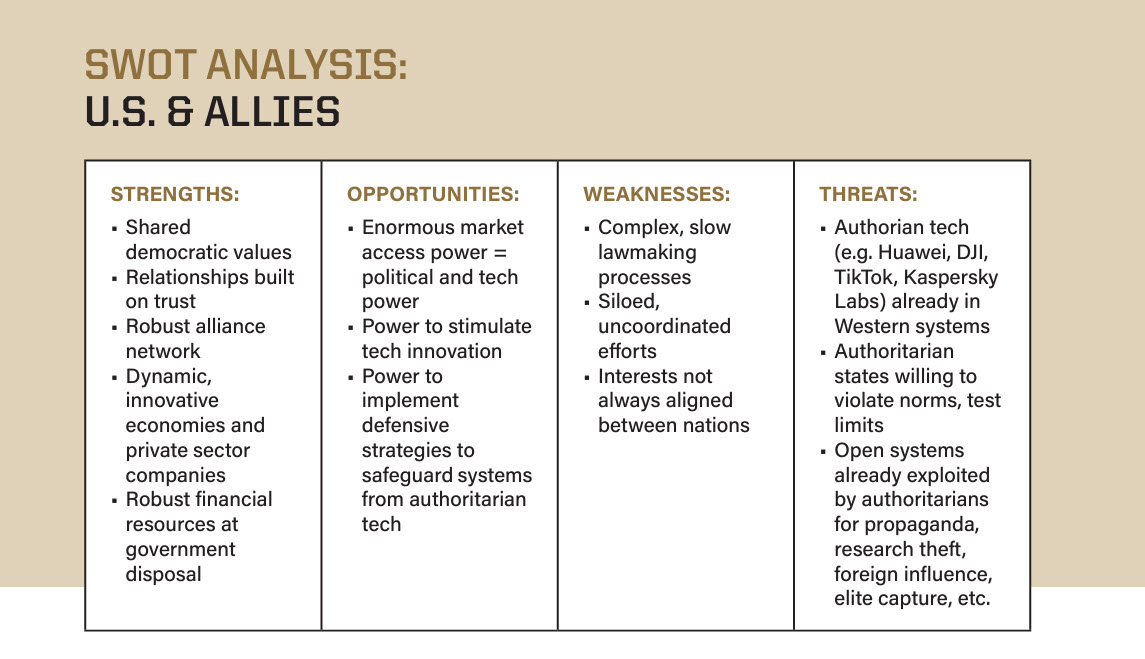
Strengths
The U.S. and its likeminded allies and partners are committed to the freedom of expression, the rule of law, impartial judiciary systems, and the protection of property rights. These political features consequently undergird economic systems characterized by open markets, fair competition, international collaboration, robust capital investment, and regulatory frameworks that lead to historic accomplishments in innovation and enterprise. These features have allowed companies located in the free world to become the world’s leading innovators in key emerging technologies: think ASML (semiconductor manufacturing equipment) in the Netherlands, Palantir (artificial intelligence) in the United States, or Samsung (5G and 6G) in South Korea.
Perhaps most importantly, the likeminded nations of the free world are bound by shared values and a history of collaboration that has established high levels of trust. Many nations have their military or economic ties formalized through the NATO alliance and the European Union and have a history of cooperating to combat shared threats, whether it was Soviet communism during the Cold War or Islamist terrorism in the Global War on Terrorism. Consequently, these nations can trust that the others are generally committed to pursuing similar geopolitical ends, thereby laying a basis for eager cooperation. The power contained in these alliances is the free world’s most powerful competitive advantage in the geopolitical arena.
| “The United States and its allies dominated the global innovation stage for decades due to the unique environment of civil liberties, transparent government, and robust intellectual property regimes that encouraged citizens and enterprises of all sizes to engage in creative endeavors that collectively bolster our economies, sharpen our competitiveness, and strengthen our national security.”
— Andrei Iancu, Global Tech Security Commissioner for Intellectual Property, May 2023
|
Weaknesses
Freedom also presents inherent challenges. Passing national security-focused legislation through democratic legislative processes marked by open and transparent debate is often a complex and slow-moving process. Coordinating efforts across sectors and countries is also difficult, given the differing objectives between public and private sector actors, as well each country’s views of what is in its own national interests. Over the last several years, for instance, the European Union’s strategic orientation toward China has been inconsistent, in part because of divisions within the bloc over allowing China to invest in or acquire European tech companies. Consequently, nations of the free world have not forged a durable, coordinated strategy amongst themselves for responding to emerging techno-authoritarianism.
Free nations, such as those in Europe, are also being forced to rethink the conditions they must set to be conducive to tech development. Former Italian Prime Minister and head of the European Central Bank Mario Draghi has noted that, “the core problem in Europe is that new companies with new technologies are not rising in our economy.”[viii] No company with a market cap over EUR 100 billion had been set up in the last fifty years.[ix] Today, notes Draghi, Europe would need EUR 750-800 billion per year to meet its existing environmental, security, innovation, and digital infrastructure goals—a figure that is approximately twice the size of GDP which Europe dedicated to the Marshall Plan each year in the aftermath of World War II.[x] Europe’s self-assessment of its long-term strategic failure to prioritize its tech competitiveness pinpoints its inability up to now to achieve broader societal objectives.
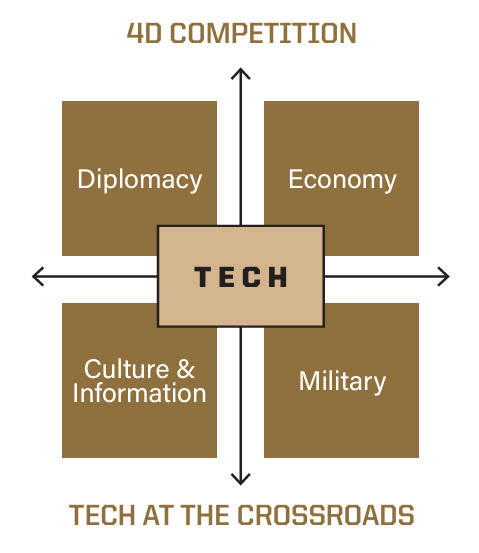 Finally, citizens in the free world have typically viewed national security as strictly a responsibility for national governments to bear. But not every national security decision is one that involves deployments of troops, appropriations of money, or economic sanctions. Business leaders have the opportunity – and duty – to make decisions that serve their respective nations’ security interests, in ways that go far beyond mere compliance with government rules. As Krach Institute CEO Michelle Giuda has emphasized, “The real strategic impetus for winning the technology race will come not from government but from our enterprising business leaders from Silicon Valley to Indianapolis to New York to Austin, with help from allies in places like Tallinn, Montevideo, Tel Aviv, and Taipei.”[xi] Much work remains to normalize this attitude within the private sector and stop free-world companies from partnering with purveyors of untrusted technologies who are dedicated to the free world’s demise. A safe, free, and prosperous world is good for business.
Finally, citizens in the free world have typically viewed national security as strictly a responsibility for national governments to bear. But not every national security decision is one that involves deployments of troops, appropriations of money, or economic sanctions. Business leaders have the opportunity – and duty – to make decisions that serve their respective nations’ security interests, in ways that go far beyond mere compliance with government rules. As Krach Institute CEO Michelle Giuda has emphasized, “The real strategic impetus for winning the technology race will come not from government but from our enterprising business leaders from Silicon Valley to Indianapolis to New York to Austin, with help from allies in places like Tallinn, Montevideo, Tel Aviv, and Taipei.”[xi] Much work remains to normalize this attitude within the private sector and stop free-world companies from partnering with purveyors of untrusted technologies who are dedicated to the free world’s demise. A safe, free, and prosperous world is good for business.
[viii] Mario Draghi, Address to the EU Parliament: Presentation of the Report on the Future of European Competitiveness, (Strasbourg, France: September 17, 2024), p. 3, https://commission.europa.eu/document/download/fcbc7ada-213b-4679-83f7-69a4c2127a25_en?filename=Address%20by%20Mario%20Draghi%20at%20the%20Presentation%20of%20the%20report%20on%20the%20future%20of%20European%20competitiveness.pdf.
[ix] Ibid.
[x] Ibid, p. 9.
[xi] Michelle Giuda, “Winning the Tech Race: Why American CEOs Must Lead, Not Follow,” The National Interest, August 23, 2024, https://nationalinterest.org/blog/techland/winning-tech-race-why-american-ceos-must-lead-not-follow-212435.
Opportunities
The world’s 12 largest democracies (by GDP) and the European Union make up nearly two-thirds of the world’s GDP, giving them enormous economic leverage within the geopolitical arena—if they can act in a coordinated fashion. Additionally, free-world companies are still the world’s leading innovators of emerging technologies, giving them opportunities to secure new market shares. National governments also have opportunities to stifle technology transfers to authoritarian states and cut off the capital investments that bolster adversaries’ militaries. Where the private sector is concerned, as global geopolitical tensions rise, business leaders who limit business relationships to trusted tech partners will enjoy greater degrees of product and supply chain security, stakeholder confidence from customers, investors and regulators alike.
Threats
Authoritarians have exhibited a track record of exploiting free societies’ freedoms and economic openness to achieve their goals. As just a few examples, RT—a Russian propaganda network—operated with relative impunity on American television until 2022, and companies partnering with the Chinese military have listed on American stock exchanges. Chinese military personnel posing as innocent graduate students have infiltrated campuses in countries like Australia, Germany, Singapore, the UK and the U.S. with the intent to steal high-tech research.
Additionally, many companies and state/local/federal governments have adopted technologies produced by companies owned by or headquartered in authoritarian states (e.g. Huawei routers, DJI drones, Kaspersky Labs software, or ZPMC cargo cranes). Now spread across the free world, those technologies become access points for authoritarians to steal, spy and sabotage.
| House China Committee: ZPMC Cargo Cranes Are A “Trojan Horse”
Chinese cargo crane manufacturer ZPMC manufactures 80% of U.S. ship-to-shore cranes in operation at U.S. ports. A 2024 House Select Committee on the Chinese Communist Party investigation discovered, “ZPMC could, if desired, serve as a Trojan horse capable of helping the CCP and the PRC military exploit and manipulate U.S. maritime equipment and technology at their request. This vulnerability in our critical infrastructure has the potential to affect Americans from coast to coast.”[xii]
|
In total, authoritarian regimes have a sustained appetite to defy international norms and sacrifice the interests of their own people to achieve their geopolitical goals, thus creating pressure on free societies to decide whether, or how, they will impose costs for rogue behavior.
[xii] “Investigation by Select Committee on the CCP, House Homeland Finds Potential Threats to U.S. Port Infrastructure Security from China,” House Select Committee on the Chinese Communist Party, Press Release , September 12, 2024, https://selectcommitteeontheccp.house.gov/media/press-releases/investigation-select-committee-ccp-house-homeland-finds-potential-threats-us
Authoritarian Regimes
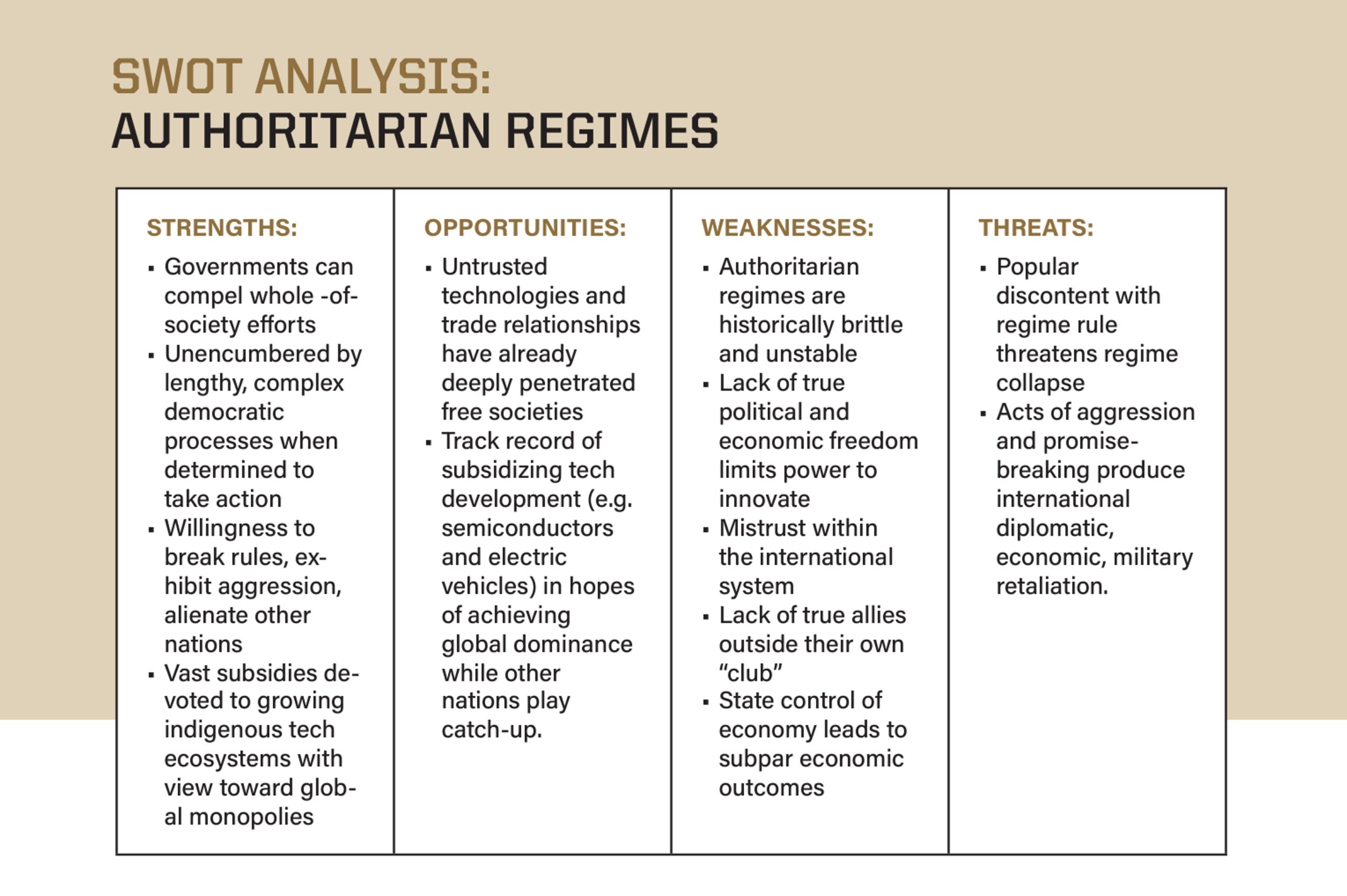
Strengths
Authoritarian states can compel or incentivize all aspects of their tech and business sectors to participate in achieving regime goals. Thus, even nominally private firms can become weaponized as arms of state power, especially in the tech sector. Thanks to a patchwork of national laws, the Chinese government can order Chinese firms to engineer technologies, appropriate Western technologies, and allocate personnel to serve the state’s national security imperatives. In 2022, the Russian government effectively legalized intellectual property theft, issuing a decree that allows Russian firms to use intellectual property from “unfriendly countries” without consent or compensation. According to the website IP Watchdog, “This essentially means that Russian firms can access publicly available patent databases and practice the patents to boost struggling technological production.”[xiii]
| “The use of AI/ML technologies for surveillance and social control in China could set a precedent for other countries, raising concerns about privacy, human rights, and the potential for AI-enabled authoritarianism.”
— Dave Spirk, Global Tech Security Commissioner for Artificial Intelligence and Machine Learning
|
As a matter of techno-economic strategy, Chinese state planning and subsidies have greatly contributed to China becoming the world leader in the production of LED screens and green technologies such as electric vehicle batteries and solar panels. The success of state-funded support in concentrating production of these technologies inside China’s borders has inspired Beijing to attempt to achieve similar domination in other key technologies such as semiconductors and electric vehicles.
Additionally, authoritarian regimes have developed technologies purely for battlefield use, and in many cases already deployed them. Iran has shipped Shahed drones to Russia, where they are deployed on the battlefield in Ukraine, and the Houthi rebels in Yemen have also deployed Iranian drones in their attacks on Israel and commercial ships transiting the Red Sea. North Korea is well-known as a proliferator of ballistic missile knowhow to Iran, and Russia has shipped its S-300 missile system there as well. Disinformation operations targeting democracies, such as those performed by Russia, can also move faster than the “speed of truth”—forcing governments to address lies at a slower rate than they can be pumped out.
More broadly, authoritarians, unconstrained by complex and time-consuming democratic processes, excel at rapidly exploiting geopolitical opportunities. They are comfortable to operate outside of international norms, create economic dependencies, and bypass ethical standards in areas such as human rights, labor, respect for the environment, and application of the rule of law. Authoritarian regimes seek to exploit the technological vulnerabilities and resource wealth of developing nations, thereby leveraging financial dependencies to impose their own interests. These tactics have helped countries like China and Russia gain substantial tech-economic footholds in developing countries throughout Africa, Asia, and Latin America. The Chinese Communist Party’s now-famous Belt and Road Initiative and Digital Silk Road have expanded China’s global influence.
| China Leads the World in 37 of 44 Critical Technologies
“Our research reveals that China has built the foundations to position itself as the world’s leading science and technology superpower, by establishing a sometimes stunning lead in high-impact research across the majority of critical and emerging technology domains. China’s global lead extends to 37 out of 44 technologies that ASPI is now tracking, covering a range of crucial technology fields spanning defence, space, robotics, energy, the environment, biotechnology, artificial intelligence (AI), advanced materials and key quantum technology areas.”
— Australian Strategic Policy Institute Critical Technology Tracker, March 1, 2023 [xiv]
|
[xiii] Raj S. Dave, “What it Means that Russian Businesses Can Now Legally Steal Intellectual Property from ‘Unfriendly Countries’,” IP Watchdog, March 16, 2022, https://ipwatchdog.com/2022/03/16/russian-businesses-can-now-legally-steal-intellectual-property-unfriendly-countries/id=147528/
[xiv] Jamie Gaida et al., “ASPI’s Critical Technology Tracker,” The Australian Strategic Policy Institute, March 1, 2023, http://www.aspi.org.au/report/critical-technology-tracker.
Weaknesses
Authoritarian regimes are not without their own dramatic weaknesses. Lack of political and economic freedom stifles a culture of innovation and drives aspiring entrepreneurs and thinkers overseas. From October 2020 to January 2021, Jack Ma, the ordinarily high-profile Chinese founder of Alibaba Group, was nowhere to be seen in public view. Speculation persists that the Chinese government forcibly detained Ma or ordered him to keep a low profile after he gave a speech criticizing China’s regulators and banks.
Authoritarians’ broken promises and aggressive behaviors on the world stage have shattered trust within the international system and curtailed the free world’s willingness to share certain technologies with them, creating their own dependencies on foreign technologies and hindering them in their race to catch up to the leading companies of the free world. Finally, while China, Russia, Iran, and North Korea have increased geopolitical and military coordination with one another in recent years, these nations’ aggressive behaviors have substantially alienated other countries, and hence they have zero true allies globally apart from other unstable and often impoverished authoritarian regimes. The world’s worst authoritarian regimes maintain only partnerships of coercion, convenience, and transaction, not true alliances.
Opportunities
Authoritarian regimes have strategically embedded their technologies with widespread global adoption such as TikTok, Huawei cell phones, or BYD electric vehicles. Besides the potential for these items to serve Chinese or other authoritarian state interests through theft, surveillance and sabotage, the economic activity associated with the production or importation of such items leads to political leverage for Beijing. Authoritarian regimes routinely exploit free societies to launch legal and illegal influence campaigns, manipulate public opinion through misinformation and disinformation, and co-opt business leaders.
Additionally, authoritarian nations continue to seize the opportunity to grow influence in poor nations with weak democratic norms or resilience. Developing nations in Africa, Asia, and Latin America with growing populations, and increased technological capabilities, will be home to a significant portion of the world’s future workforce and consumer and innovator base, enhancing their influence on global markets. Without a concerted effort to steer these nations toward a model of techno-freedom, they risk falling permanently into the technological-economic orbit of authoritarian countries, thus deterring foreign private sector investment, stifling their development, and saddling them with crushing debts or loss of sovereignty.
Threats
Authoritarian regimes are more unstable than they look. Because they are willing to use repression and fear as prime tools of governance, their citizens often quietly simmer with grievances toward the regime. Hence, authoritarian regimes are consistently at risk of being overthrown by their own publics.
Moreover, state-directed economies tend to underperform nations distinguished by free markets. The Freedom & Prosperity Index developed by GTSC Commissioner for Prosperity Partnerships Dan Negrea demonstrates a strong correlation between economic prosperity and freedom, showing that as freedoms in areas such as the economy, governance, and individual rights increase, so does overall prosperity. Higher levels of freedom support a more robust economy, enhance innovation, and improve quality of life, indicating that nations with greater personal and economic liberties tend to enjoy higher prosperity levels. Externally, a growing international consensus among free societies to exclude authoritarian countries from trade relationships is putting new economic pressure on them, and countries like Iran, Russia, and North Korea have almost entirely alienated themselves from the global economy because of acts of aggression. In the case of Russia, its invasion of Ukraine triggered the expansion of NATO, the departure of more than 1,000 companies from Russia, and a wave of international sanctions.

